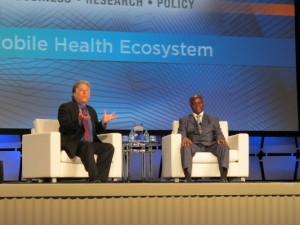
Mark Blatt and Ebenezer Appiah-Denkyira
Texting programs for health education in developing countries have been around for over a decade, but several factors are bringing global health efforts to a new scale in 2012, including increasing mobile adoption in developing countries and an increased spirit of collaboration.
Nafis Sadik, a United Nations Foundation board member, has worked with the UN on women's health since 1987. At the mHealth Summit this week Sadik delivered a keynote presentation about the opportunities provided by the wide adoption of mobile phones by women in the developing world.
"When I started work if you had access to mobile technology, it meant that you had a car," she said. "In the villages people had never seen a telephone and few had ever heard of one. Today mobile phones are everywhere."
"For me, 2013 is the year for scale for mHealth," said Patricia Mechael, Executive Director of the mHealth Alliance, in her opening remarks. She said in the nearly 10 years since she began working on mobile health programs in developing countries, "mHealth has transitioned from a novel idea to a strategy for global health. We are seeing great progress in the growth and rigor of mHealth evaluations and greater attention to evidence."
Mechael spoke about the Mobile Alliance for Maternal Action, or MAMA, a partnership between the mHealth Alliance, USAID, Johnson & Johnson, the United Nations Foundation, and BabyCenter. MAMA was founded to educate and support new mothers in Bangladesh, India, and South Africa through mobile messages, similar to Text4Baby in the US. Today the program's adaptive messaging system is used in 40 countries and reaches 20 million moms, Mechael said.
She also announced a new mHealth Alliance partnership with the Nigerian Federal Ministry of Health and with Intel, to leverage mobile technology in Nigeria's Saving One Million Lives initiative. The initiative, launched in October, seeks to eliminate the one million deaths a year in Nigeria to preventable causes.
Hajo van Beijma, CEO of Text to Change, a company that works with organizations to develop text messaging interventions in developing countries, said that when Text to Change started in 2007, it worked with companies that weren't very ambitious and launched a lot of pilot programs with no plans for follow-ups. He told MobiHealthNews the industry has learned that scale depends more on ambition than anything else.
A blog post over at the Center for Health Market Innovations site Content, partnerships now trump technology in global mHealthrecapped van Beijma's panel at the Summit. In it, researcher Lily Wei mentions three dimensions of scaling: project, with refers to the content of specific programs, platform, which refers to the technology used, and strategy, the effectiveness of the intervention in bringing behavior change to end users. Van Beijma says there's been a shift in prioritizing those dimensions.
"At the beginning, the assumption was that if you had good technology and a good platform, you would scale," he said. "Now the general assumption is if you have good content and good partnerships you'll scale."
Van Beijma's Text to Change has been exploring bigger partnerships, he said, teaming up with companies he once would have considered competitors. Last year they made their proprietary software freely available to better facilitate partnerships. Wei concludes that one of the big goals of the global heath track of the Summit was to better facilitate these partnerships.
Van Beijma also said that it's often more productive to integrate mobile health with other mobile initiatives like mobile banking and mobile agriculture than to promote it in isolation.
Dr. Ariel Pablo-Mendez, Assistant Administrator for Global Health with USAID, made similar points in his keynote address. He said mobile money has the potential to reduce corruption in healthcare systems in emerging economies, and mobile-enabled human resource management systems like IRIS can help manage clinic and aid workers.
Mark Blatt, Worldwide Medical Director at Intel shared keynote session with Ebenezer Appiah-Denkyira, Director General of the Ghana Health Service. They spoke about taking the scope of global mobile health beyond texting programs.
As developing countries build their healthcare system, Blatt said, they can integrate mobile health and electronic data management from the beginning.
"How can we use these tools to empower citizens to better care for themselves so we diminish the pressure on the healthcare system?" he said. "Mobile tools offer emerging economies an opportunity not to make the same mistakes we made in our western healthcare system."
Van Beijma agreed. "Africa is famous for leapfrogging with regards to technology," he said. "The fact that they were lagging behind technologically is actually helping them because they can skip all kinds of technology we don't like anymore, like landlines."

















